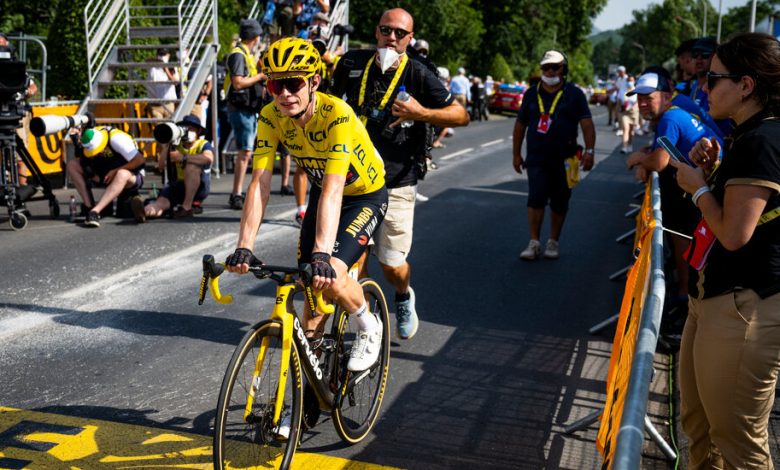It’s an Honor to Wear This Jersey. It’s Also Kind of a Pain.

Jonas Vingegaard had been wearing the famed yellow jersey bestowed upon the leader of the Tour de France for almost a week when the question came.
It was not a question about race strategy or maintaining speed, or about the best way to keep his nerve, and his lead, through more days of winding road, sharp curves and punishing ascents. It was not a question about fitness, or form.
Might he be more comfortable, Vingegaard was asked, if he was in second place?
“It would be easier, yes,” he replied. “For sure.”

Vingegaard, in the distinctive yellow jersey, led the peleton at the start of Stage 13. Donning the jersey can be an emotional moment for riders. “My mind is exploding,” the Belgian rider Yves Lampaert said last year when he put it on.
For all the honor and respect it garners, for all it signifies in a sport obsessed with data and detail, the hallowed yellow jersey comes threaded with a surprising number of inconveniences and disadvantages.
Teams may spend hours using a wind tunnel, for example, to perfect every detail of a rider’s positioning, bike and clothing. The reward, if the rider does well enough to move into the lead? A new jersey from the race’s official sponsor, Santini, that may not fit or perform in the same way.
“It’s a little bit different,” said Tadej Pogacar, a two-time winner of the Tour and a regular wearer of the yellow jersey. “You’re not used to it.”
Then there are the obligations. After crossing the finish line of each day’s stage, the race leader is whisked through a dizzying series of tasks. He is interviewed by the Tour. He is interviewed by the race’s official broadcast partners. He signs several jersey facsimiles. He ascends the podium, along with a few other riders (a group that includes the stage winner and the leaders of several other classifications) for a presentation and photographs.
After that, he must navigate a gantlet of journalists and a video news conference. The final stop, and potentially the longest, is at doping control. He is there until nature calls. “I would be one hour earlier at the hotel every day,” Vingegaard said, if only he was not in the yellow jersey.
Still, for every other rider, wearing it for even a day is the highest honor, a first-line-of-the-obituary moment. “My mind is exploding,” Yves Lampaert said last year, his eyes filling with tears, after taking a surprise victory in the race’s opening time trial. “I’m just a farmer’s son from Belgium.”
So universally understood is the mystique of the maillot jaune, as the jersey is known in French, that there is no need to even specify the color when referring to it. It is simply, The Jersey. And at an event where the color yellow is inescapable — fluttering from flags, clinging to sweat-soaked spectators and chosen for the lanyards hanging around the necks of journalists, organizers, V.I.P.s and even police officers — it is actually less prevalent in the race itself. There, its distinctive shade, Pantone Yellow 1000, is meant to be seen in only one place: on the back of the race leader. (Race leaders have been known to ride a yellow bike or wear other yellow gear, too.)
“The fries are done!” a voice yells as an urgent beeping interrupts the bustle around the trailers and trucks scattered outside the press center in Moulins after Stage 11. Fabrice Pierrot chuckles and releases the press he is standing over. After slipping a small block of wood into the mechanism to hold it open, he gingerly removes a yellow jersey bearing the still-steaming logo of Vingegaard’s team, Jumbo-Visma.
Pierrot is the Tour’s jersey printer, tasked with producing special jerseys each day for the podium, as well as for the next day’s race. Backstage at the podium, Pierrot takes notes from the riders, though after 20 years on the job he can usually size them up by sight. “This generation, like Pogacar, never a word. I like working with them.” On this day, by the time Vingegaard is finished, almost exactly an hour after he rolled across the line, his team bus and those of every other team are long gone. Barriers are being dismantled, and the podium is being folded back into a trailer. He is as he has been for days: dressed in yellow, and proud of it.
“It doesn’t fit as well, but it fits OK,” Vingegaard said, a faint smile creeping onto his normally stoic face. “I prefer to be in The Jersey over my normal jersey.”
